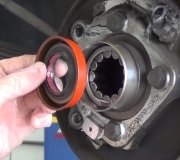He assured me the first thing he would do would be check the compression in the engine. If the engine was shot, there would be no reason to look at the rest of the car for any needed maintenance, etc. Again, I made sure he understood I was not interested in putting any more money into this car if it wasn't worth it.
The next day we talked again and he told me the compression test was good. He did indicate that engine had been worked on in the past, but he felt from the test that it was still a good engine. Because of recommendation, I decided to look at any other issued with the car. I knew it needed tires, and that the tires on it were worn on the inside and he explained that alignment was needed, and that the rear axle was slightly bent, maybe from a slide on ice into a curb type thing. He replaced the axle with a used one.
So, $1600 worth of repairs were done, including a complete set of 4 new tires. I spent this money on his recommendation that the engine was in good shape and the car worth the repairs.
Once the car was repaired I drove it to my daughter who lives about 75 miles away. There is a section of curvy road on this route, and I was pleased with the way the car handled and noticed no problems.
Two weeks later, I get a call from my ex-husband, who lives in the same town as my daughter, and he is calling to give me bad news about the car. Apparently the car broke down again, and he had it taken to his mechanic. (Mechanic #2). His mechanic told him the engine was shot, AND that it was apparent it had over heated before and been worked on. I proceeded to go through all I was told from my mechanic (Mechanic #1), and that he had done a compression test on the engine and had assured me it was in good shape. The ex said something about them being able to tweak the compression on a bad engine to hide the fact that it was bad.
My question is first, Is this true? Can a mechanic tweak an engine to mask that it is actually bad?
Question number two is, do I have any recourse with Mechanic #1? I would not have spent that $1600 if he had detected the engine was indeed in bad shape. I feel betrayed.
SPONSORED LINKS
Friday, August 27th, 2010 AT 7:05 PM



